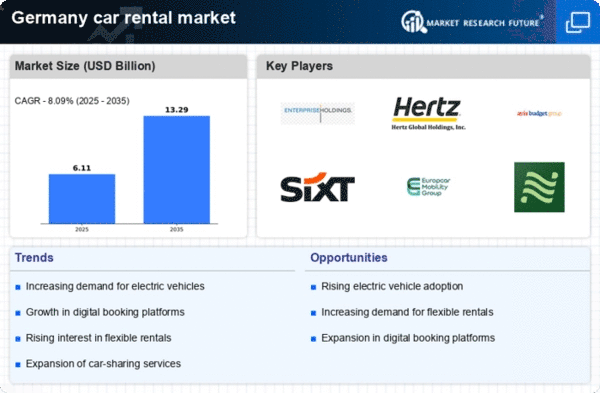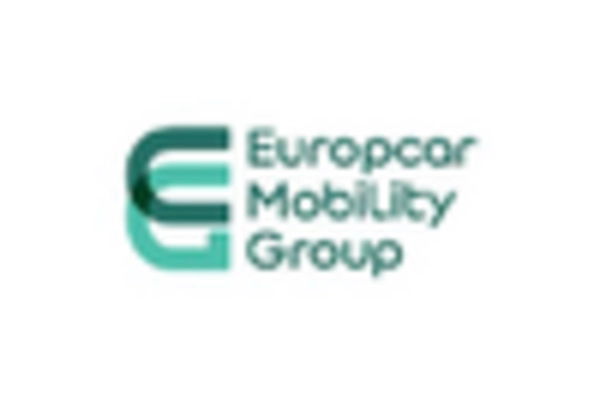Tourism Growth
The tourism sector in Germany is a vital driver for the car rental market. With millions of international visitors arriving annually, the need for rental vehicles to explore the country is substantial. In 2025, tourism is projected to contribute approximately €100 billion to the economy, with a significant portion allocated to transportation services. Rental cars provide tourists with the flexibility to travel at their own pace, enhancing their overall experience. This influx of tourists not only boosts demand for rental services but also encourages rental companies to expand their fleets and improve service offerings. The car rental market is thus poised for growth as tourism continues to thrive.
Increasing Urbanization
The trend of urbanization in Germany is driving the car rental market as more individuals seek flexible transportation options. With approximately 77% of the population residing in urban areas, the demand for car rentals is likely to rise. Urban dwellers often prefer renting vehicles for short-term needs rather than owning a car, which can be costly and impractical in densely populated cities. This shift towards rental services is further supported by the growing number of tourists visiting urban centers, who require convenient transportation solutions. The car rental market is thus positioned to benefit from this demographic shift, as urbanization continues to influence consumer behavior and preferences.
Environmental Regulations
Germany's stringent environmental regulations are influencing the car rental market, pushing companies to adopt more sustainable practices. The government has set ambitious targets for reducing carbon emissions, which may lead to increased demand for eco-friendly vehicles in rental fleets. By 2025, it is anticipated that at least 30% of rental cars will be electric or hybrid models, aligning with national sustainability goals. This shift not only meets regulatory requirements but also appeals to environmentally conscious consumers. As awareness of climate change grows, the car rental market is likely to see a rise in demand for greener options, reflecting broader societal trends towards sustainability.
Technological Advancements
Technological innovations are reshaping the car rental market in Germany. The integration of mobile applications and online booking systems has streamlined the rental process, making it more user-friendly. In 2025, it is estimated that over 60% of rentals are booked online, reflecting a significant shift in consumer behavior. Additionally, advancements in vehicle tracking and management systems enhance operational efficiency for rental companies. These technologies not only improve customer experience but also enable companies to optimize their fleets, reducing costs and increasing profitability. As technology continues to evolve, it is expected to play a crucial role in the growth of the car rental market.
Changing Consumer Preferences
Consumer preferences in Germany are evolving, impacting the car rental market. A growing number of individuals are prioritizing convenience and flexibility over traditional car ownership. This shift is particularly evident among younger generations, who are more inclined to use rental services for short trips or special occasions. Surveys indicate that around 40% of millennials prefer renting over owning a vehicle, reflecting a broader trend towards shared mobility solutions. As these preferences continue to change, the car rental market is likely to adapt by offering tailored services that meet the needs of modern consumers, thereby fostering growth and innovation.
















